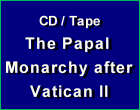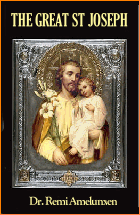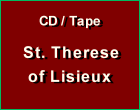Special Devotions
 |
 |
 |
 |
 |
 |
 |
Feast of Glory and of Peace
"Glory to God in the highest, and on earth peace to men of good will" (Lk 2:14)
It is impossible for any Catholic to meditate on Holy Christmas without recalling – and we could almost say hearing – these harmonious words the Angels sang to announce to men the great news of the coming of the Savior. So, it is on these words we will make our Christmas meditation, here, before the Nativity Scene, at the feet of the Child-God and very close to Mary Most Holy.
The value of glory
"Glory." How many effulgent moral values were seen in the meaning of this word in Antiquity!
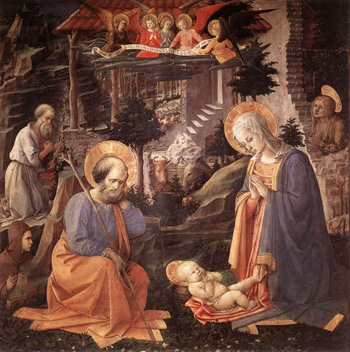 It was to have glory that so many kings strived to spread their dominion, so many armies faced death, so many scholars dedicated themselves to arduous studies, so many trailblazers plunged into the most terrible solitudes, so many poets created lofty works, so many musicians plucked from their very depths their most vibrant notes and, finally, so many businessmen threw themselves headlong into vast enterprises. Yes, even in the quest for richness, there are not just factors of money, comfort and safety, but also power, prestige and – in a word – glory.
It was to have glory that so many kings strived to spread their dominion, so many armies faced death, so many scholars dedicated themselves to arduous studies, so many trailblazers plunged into the most terrible solitudes, so many poets created lofty works, so many musicians plucked from their very depths their most vibrant notes and, finally, so many businessmen threw themselves headlong into vast enterprises. Yes, even in the quest for richness, there are not just factors of money, comfort and safety, but also power, prestige and – in a word – glory.
But, what elements compose this notion of glory? Some were inherent to the person: an elevated mind, great virtue and outstanding actions. Others were linked to what is today called public opinion. Glory, viewed from this angle, would be fame, a far-reaching recognition of one's eminent qualities.
And what is glory worth? In what sense does the desire for glory elevate the soul?
One can easily respond to the question by comparing a man avid for glory with another who greedily longs for goods of a different kind: sleeping long nights in a soft bed, eating lavishly and abundantly, feeling safe from risks and uncertainties, living without struggle or effort, immersed in amusements and pleasures, etc.
There is no doubt that material goods were created for our use and that in proper measure and to due extent man may desire these goods. But, when one raises them up to be the supreme values of existence, he reveals a low, egotistic and narrow spirit. In a word, one belonging to that category Holy Scripture strongly denounces: those for whom God is their belly (cf. Phil 3:19). Those are men who are only concerned about the body, who ignore all the true goods of the soul and who, if they could, would – as Claudel wrote – make the stars fall from the sky and turn them into potatoes.
A false peace
We remember all this because in the imponderable aspects of Khrushchev's visit to the United States and the many favorable comments that have been published worldwide, what is insinuated is precisely this worldview. That is, the sole authentic aim of human society would be to promote a profitable and pleasant life. All religious, philosophical and artistic questions would have only a minor importance or none at all.
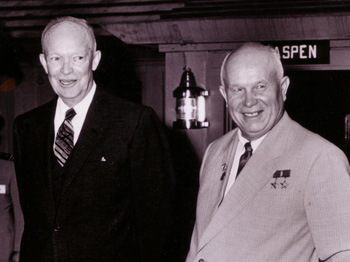 If, then, the world is divided into a communist "hemisphere" and another that is not, the only important point in the division would not be the ideological divergence, but the contradiction of economic interests. In terms of material advantages, what matters most is avoiding a war – even if the world must implicitly resign itself to a gradual bolshevization.
Thus, what the West must preserve above all is a peaceful coexistence among peoples. Peace must be attained at all costs, because the damages of war are incalculable.
If, then, the world is divided into a communist "hemisphere" and another that is not, the only important point in the division would not be the ideological divergence, but the contradiction of economic interests. In terms of material advantages, what matters most is avoiding a war – even if the world must implicitly resign itself to a gradual bolshevization.
Thus, what the West must preserve above all is a peaceful coexistence among peoples. Peace must be attained at all costs, because the damages of war are incalculable.
Such an attitude reduces us to a life of ignominy, of little import. We will be slaves of the omnipotent State, lost in an immense mass of anonymous people, disfigured by a "culture" that seeks to eliminate personalities and standardize men. A society that denies morality, the existence of the soul and even a just and merciful God: all this is of little import. But, at least we will have avoided for ourselves and our children the devastations and deprivations of war. Infamy is a price worth paying to obviate so many evils. For this reason, it is better to cease all polemics with Communism.
Then, when every effort is made to avoid war – using all the resources of diplomacy, including summit meetings – no Christian heart can deny his ardent assent to this peace. But, to arrive at such a result, it is necessary to impose a general demobilization of those who are vigilant against the communist danger. This allows Moscow to promote an easy, efficient ideological penetration of its errors throughout the world. And this is what we can in no way admit.
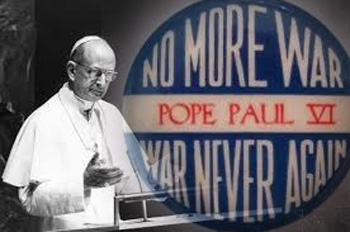 Herein lies, however, for millions of souls, the supreme temptation because they live in a world where the word "glory" has become almost meaningless. It still exists in the dictionaries, it is still used at times in familiar language – for example, in the names of cities, streets or hotels, or on cigar labels like Glória de Cuba. Other than this, it could almost be said the word is dead. And, with its disuse comes the disappearance of other words related to it: honor, prestige, decorum ...
Herein lies, however, for millions of souls, the supreme temptation because they live in a world where the word "glory" has become almost meaningless. It still exists in the dictionaries, it is still used at times in familiar language – for example, in the names of cities, streets or hotels, or on cigar labels like Glória de Cuba. Other than this, it could almost be said the word is dead. And, with its disuse comes the disappearance of other words related to it: honor, prestige, decorum ...
It would be interesting to read a newspaper from 100 years ago to see the role that these values had, then, among people, families, social groups or nations. Today, one opens a newspaper and usually reads about men joining together or fighting for other reasons: exports, imports, foreign exchange, tariffs and the like.
Double lesson on glory
In the face of this world that has deliriously hypertrophied the importance of the material life, on the occasion of Holy Christmas Our Lord gives us, fully and soundly, a most opportune double lesson.
First, let us consider the way of life of the Holy Family. A dynasty that lost the throne and its wealth has in St. Joseph a sapling that lives in poverty. The Blessed Virgin accepts this situation with perfect peace. Both strive to maintain an orderly and composed existence in this poverty, but their minds are not filled with plans for rising economically, comfort and pleasures, but rather with cogitations concerning God Our Lord.
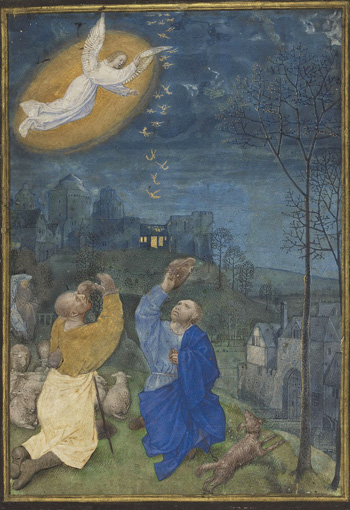 The Holy Family can provide only a cave for Christ's first dwelling and a manger for His cradle. But the Son is the Incarnate Word, for whose birth the night shines, the sky opens and the Angels sing, and to Whom from the ends of the earth three Kings filled with wisdom come to offer gold, incense and myrrh.
The Holy Family can provide only a cave for Christ's first dwelling and a manger for His cradle. But the Son is the Incarnate Word, for whose birth the night shines, the sky opens and the Angels sing, and to Whom from the ends of the earth three Kings filled with wisdom come to offer gold, incense and myrrh.
How much poverty... and how much glory! True glory because it is not a "cost estimate" made by the utilitarian and Pharisaic men of Jerusalem who appreciate others according to the measure of their riches. Rather, it is a glory that is a reflection of the only true glory: that of God in the highest Heavens.
It is often said that the poverty of the Holy Family in Bethlehem teaches us detachment from the goods of the earth, and this is a thousand times true. It should be added, however, that there is, beyond this, a high and lucid teaching at Holy Christmas on the value of the goods of Heaven and the moral goods on earth that stand as a figure of the heavenly ones. In this respect, there is perhaps a confused thinking that should be clarified.
God created the universe for His extrinsic glory. Thus, all irrational creatures tend wholly to the glorification of God. And man, endowed with intelligence and free will, has an obligation to employ the potentialities of his soul – and his whole being – for the same purpose. His ultimate purpose is not to live a happy, easy and carefree life, but to give glory to God.
Now then, man achieves this by disposing all his interior and exterior acts toward recognizing and proclaiming the infinite perfections and the sovereign power of the Creator. Created in the image of God, man gives glory to Him, seeking to imitate Him as much as possible in his nature as a mere creature. Thus, our comprehension of God and our love for Him, to the measure it makes us similar to Him, also makes us participants in His glory.
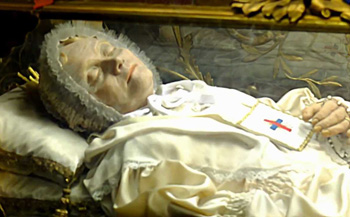 This explains the immense respect the Saints have always awakened even in those who hated and persecuted them. A simple cook, like Blessed Ana Maria Taigi, walking the streets of Rome impressed passersby with her respectability. In all the apparitions of Our Lady, she manifests herself as extremely maternal, amiable and condescending, but at the same time indescribably dignified, respectable and refulgent in royal majesty. And what can be said of Our Lord, the source of all holiness? He was so condescending that He even washed the feet of the Apostles! But, so infinitely majestic that a word from Him made all the soldiers who came to arrest Him fall to the ground (cf. John 18:6).
This explains the immense respect the Saints have always awakened even in those who hated and persecuted them. A simple cook, like Blessed Ana Maria Taigi, walking the streets of Rome impressed passersby with her respectability. In all the apparitions of Our Lady, she manifests herself as extremely maternal, amiable and condescending, but at the same time indescribably dignified, respectable and refulgent in royal majesty. And what can be said of Our Lord, the source of all holiness? He was so condescending that He even washed the feet of the Apostles! But, so infinitely majestic that a word from Him made all the soldiers who came to arrest Him fall to the ground (cf. John 18:6).
Now then, Jesus Christ is our model. The Saints, who imitated Him magnificently, are also models. Thus, every true Catholic must strive for a high respectability, gravity, firmness and elevation that must distinguish him from the vulgarity, dirtiness and extravagance of everything that falls under the dominion of Satan.
This, then, is not just a splendor that comes from the practice of virtue. All power comes from God (Rom 13: 1) – that of the King as well as that of the nobleman, the father, the patron or the teacher. In some way the holder of a position must be for his subjects like an image of God. There is an intrinsic dignity in all power, which is a reflection of the divine majesty.
Thus, in a Catholic society, one who holds any relevant position must respect himself because of this situation. He must convey that respect to those with whom he deals. In this way, Catholic temporal society shines with the glory of God. It sings His glory in its own particular way, just as spiritual society, which is the Holy Roman, Catholic, and Apostolic Church, also sings with her ineffable tones. Here on earth the life of man becomes a harbinger of that song of glory that is intoned in Heaven for the endless ages.
The glory of God vs self-glorification
Someone may protest, "Isn't the love of one's own glory a type of pride?"
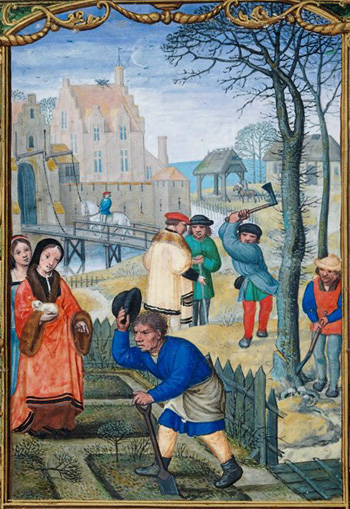 No, a thousand times no, if the matter is well understood.
No, a thousand times no, if the matter is well understood.
If anyone loves his own glory and not the glory of God, there is pride in this. If one loves his own glory not because it is a reflection of the glory of God but only because it is a way to receive homage, exercise dominion over others or control events, in this there is pride. But, if a man desires to merit the respect of his neighbor only so that God may be glorified, he shows grandeur of soul and true humility.
We know that often a subtle pride can deceive a person, giving him the impression that he seeks glory for the love of God when he really only desires it for love of self. To avoid this risk – which unfortunately is a very real one – it is necessary to pray, frequent the Sacraments, meditate, mortify oneself, practice rigorous examinations of conscience and submit to spiritual direction. The remedy is to employ these most efficatious means, and never to deny true principles.
What is good will?
And what about good will? Doesn't it consist of "democratizing" ourselves, putting ourselves on the same level as everyone in order to attract their love?
One of the most fatal errors of our time is to imagine that respect and love exclude one another, and that the less respected a king, a father or a teacher is, the more loved he will be. The truth is the opposite. High respectability, whenever it is steeped in a true love of God, can only attract the esteem and confidence of righteous men. When this is not the case, it is not because respectability is so high, but because its foundation is not the love of God.
The solution is not to lower oneself, but to become more supernatural.
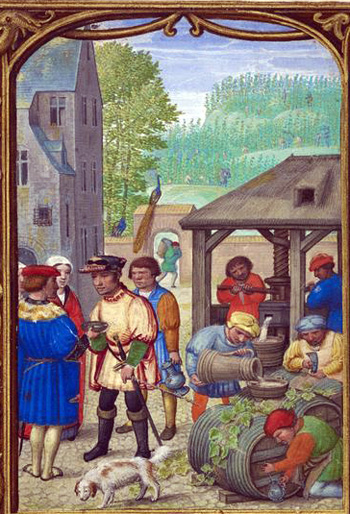 A true supernatural dignity can abase itself without being abased. On the other hand, an egotistic and vain dignity neither desires nor knows how to condescend itself while remaining fully itself. When it feels strong, it debases others. When it feels weak, from fear it debases itself.
A true supernatural dignity can abase itself without being abased. On the other hand, an egotistic and vain dignity neither desires nor knows how to condescend itself while remaining fully itself. When it feels strong, it debases others. When it feels weak, from fear it debases itself.
Imagine, then, a temporal society impregnated with this high, majestic and strong nobility, a reflection of the sublimity of God. A society where a great elevation was indissolubly linked to an immense goodness, in such a way that the more strength and majesty increased, the more commiseration and goodness would grow alongside it. What suavity! What sweetness! In a word, what order! What order, yes... and what great peace. For what is peace but tranquility in order (St. Augustine, De Civ. Dei, ch. 13)?
Stagnation in error and evil, concord with the followers of Satan, an apparent conciliation between light and darkness that, thus, confers citizenship to evil, only bring disorder and generate a tranquility that is the caricature of true peace.
True peace exists only among men of good will, who seek the glory of God with all their hearts.
In this way the message of Christmas links one thing with the other:
"Glory to God in the highest, and on earth peace to men of good will" (Lk 2:14).

It is impossible for any Catholic to meditate on Holy Christmas without recalling – and we could almost say hearing – these harmonious words the Angels sang to announce to men the great news of the coming of the Savior. So, it is on these words we will make our Christmas meditation, here, before the Nativity Scene, at the feet of the Child-God and very close to Mary Most Holy.
The value of glory
"Glory." How many effulgent moral values were seen in the meaning of this word in Antiquity!

The glory and peace of the Nativity
But, what elements compose this notion of glory? Some were inherent to the person: an elevated mind, great virtue and outstanding actions. Others were linked to what is today called public opinion. Glory, viewed from this angle, would be fame, a far-reaching recognition of one's eminent qualities.
And what is glory worth? In what sense does the desire for glory elevate the soul?
One can easily respond to the question by comparing a man avid for glory with another who greedily longs for goods of a different kind: sleeping long nights in a soft bed, eating lavishly and abundantly, feeling safe from risks and uncertainties, living without struggle or effort, immersed in amusements and pleasures, etc.
There is no doubt that material goods were created for our use and that in proper measure and to due extent man may desire these goods. But, when one raises them up to be the supreme values of existence, he reveals a low, egotistic and narrow spirit. In a word, one belonging to that category Holy Scripture strongly denounces: those for whom God is their belly (cf. Phil 3:19). Those are men who are only concerned about the body, who ignore all the true goods of the soul and who, if they could, would – as Claudel wrote – make the stars fall from the sky and turn them into potatoes.
A false peace
We remember all this because in the imponderable aspects of Khrushchev's visit to the United States and the many favorable comments that have been published worldwide, what is insinuated is precisely this worldview. That is, the sole authentic aim of human society would be to promote a profitable and pleasant life. All religious, philosophical and artistic questions would have only a minor importance or none at all.

Pres. Eisonhower meets Soviet Premier Khrushchev to forge a false peace, Camp David, 1959
Such an attitude reduces us to a life of ignominy, of little import. We will be slaves of the omnipotent State, lost in an immense mass of anonymous people, disfigured by a "culture" that seeks to eliminate personalities and standardize men. A society that denies morality, the existence of the soul and even a just and merciful God: all this is of little import. But, at least we will have avoided for ourselves and our children the devastations and deprivations of war. Infamy is a price worth paying to obviate so many evils. For this reason, it is better to cease all polemics with Communism.
Then, when every effort is made to avoid war – using all the resources of diplomacy, including summit meetings – no Christian heart can deny his ardent assent to this peace. But, to arrive at such a result, it is necessary to impose a general demobilization of those who are vigilant against the communist danger. This allows Moscow to promote an easy, efficient ideological penetration of its errors throughout the world. And this is what we can in no way admit.

No more war, proclaims Paul VI, a false call echoed by all the post-conciliar Popes
It would be interesting to read a newspaper from 100 years ago to see the role that these values had, then, among people, families, social groups or nations. Today, one opens a newspaper and usually reads about men joining together or fighting for other reasons: exports, imports, foreign exchange, tariffs and the like.
Double lesson on glory
In the face of this world that has deliriously hypertrophied the importance of the material life, on the occasion of Holy Christmas Our Lord gives us, fully and soundly, a most opportune double lesson.
First, let us consider the way of life of the Holy Family. A dynasty that lost the throne and its wealth has in St. Joseph a sapling that lives in poverty. The Blessed Virgin accepts this situation with perfect peace. Both strive to maintain an orderly and composed existence in this poverty, but their minds are not filled with plans for rising economically, comfort and pleasures, but rather with cogitations concerning God Our Lord.

Shepherds with their simple dignity called by the Angels to adore the Christ Child
How much poverty... and how much glory! True glory because it is not a "cost estimate" made by the utilitarian and Pharisaic men of Jerusalem who appreciate others according to the measure of their riches. Rather, it is a glory that is a reflection of the only true glory: that of God in the highest Heavens.
It is often said that the poverty of the Holy Family in Bethlehem teaches us detachment from the goods of the earth, and this is a thousand times true. It should be added, however, that there is, beyond this, a high and lucid teaching at Holy Christmas on the value of the goods of Heaven and the moral goods on earth that stand as a figure of the heavenly ones. In this respect, there is perhaps a confused thinking that should be clarified.
God created the universe for His extrinsic glory. Thus, all irrational creatures tend wholly to the glorification of God. And man, endowed with intelligence and free will, has an obligation to employ the potentialities of his soul – and his whole being – for the same purpose. His ultimate purpose is not to live a happy, easy and carefree life, but to give glory to God.
Now then, man achieves this by disposing all his interior and exterior acts toward recognizing and proclaiming the infinite perfections and the sovereign power of the Creator. Created in the image of God, man gives glory to Him, seeking to imitate Him as much as possible in his nature as a mere creature. Thus, our comprehension of God and our love for Him, to the measure it makes us similar to Him, also makes us participants in His glory.

Anna Maria Taigi, a simple housewife with an immense dignity
Now then, Jesus Christ is our model. The Saints, who imitated Him magnificently, are also models. Thus, every true Catholic must strive for a high respectability, gravity, firmness and elevation that must distinguish him from the vulgarity, dirtiness and extravagance of everything that falls under the dominion of Satan.
This, then, is not just a splendor that comes from the practice of virtue. All power comes from God (Rom 13: 1) – that of the King as well as that of the nobleman, the father, the patron or the teacher. In some way the holder of a position must be for his subjects like an image of God. There is an intrinsic dignity in all power, which is a reflection of the divine majesty.
Thus, in a Catholic society, one who holds any relevant position must respect himself because of this situation. He must convey that respect to those with whom he deals. In this way, Catholic temporal society shines with the glory of God. It sings His glory in its own particular way, just as spiritual society, which is the Holy Roman, Catholic, and Apostolic Church, also sings with her ineffable tones. Here on earth the life of man becomes a harbinger of that song of glory that is intoned in Heaven for the endless ages.
The glory of God vs self-glorification
Someone may protest, "Isn't the love of one's own glory a type of pride?"

In a Catholic society man reflects the dignity of his position in dress and attitude
If anyone loves his own glory and not the glory of God, there is pride in this. If one loves his own glory not because it is a reflection of the glory of God but only because it is a way to receive homage, exercise dominion over others or control events, in this there is pride. But, if a man desires to merit the respect of his neighbor only so that God may be glorified, he shows grandeur of soul and true humility.
We know that often a subtle pride can deceive a person, giving him the impression that he seeks glory for the love of God when he really only desires it for love of self. To avoid this risk – which unfortunately is a very real one – it is necessary to pray, frequent the Sacraments, meditate, mortify oneself, practice rigorous examinations of conscience and submit to spiritual direction. The remedy is to employ these most efficatious means, and never to deny true principles.
What is good will?
And what about good will? Doesn't it consist of "democratizing" ourselves, putting ourselves on the same level as everyone in order to attract their love?
One of the most fatal errors of our time is to imagine that respect and love exclude one another, and that the less respected a king, a father or a teacher is, the more loved he will be. The truth is the opposite. High respectability, whenever it is steeped in a true love of God, can only attract the esteem and confidence of righteous men. When this is not the case, it is not because respectability is so high, but because its foundation is not the love of God.
The solution is not to lower oneself, but to become more supernatural.

A society impregnated with order and peace
Imagine, then, a temporal society impregnated with this high, majestic and strong nobility, a reflection of the sublimity of God. A society where a great elevation was indissolubly linked to an immense goodness, in such a way that the more strength and majesty increased, the more commiseration and goodness would grow alongside it. What suavity! What sweetness! In a word, what order! What order, yes... and what great peace. For what is peace but tranquility in order (St. Augustine, De Civ. Dei, ch. 13)?
Stagnation in error and evil, concord with the followers of Satan, an apparent conciliation between light and darkness that, thus, confers citizenship to evil, only bring disorder and generate a tranquility that is the caricature of true peace.
True peace exists only among men of good will, who seek the glory of God with all their hearts.
In this way the message of Christmas links one thing with the other:
"Glory to God in the highest, and on earth peace to men of good will" (Lk 2:14).

"Catolicismo" n. 108, December 1959
Posted December 13, 2017
Posted December 13, 2017
______________________
______________________




